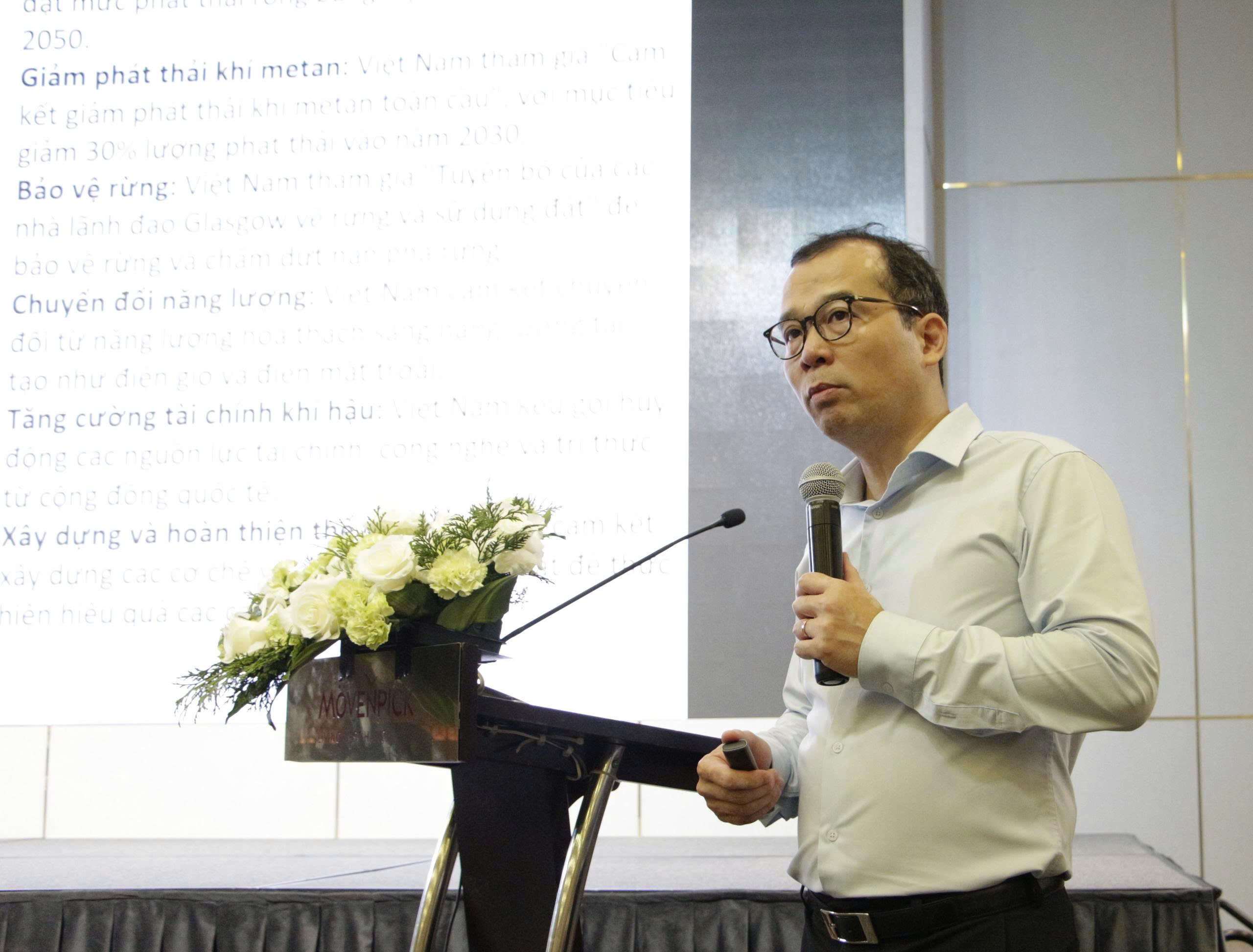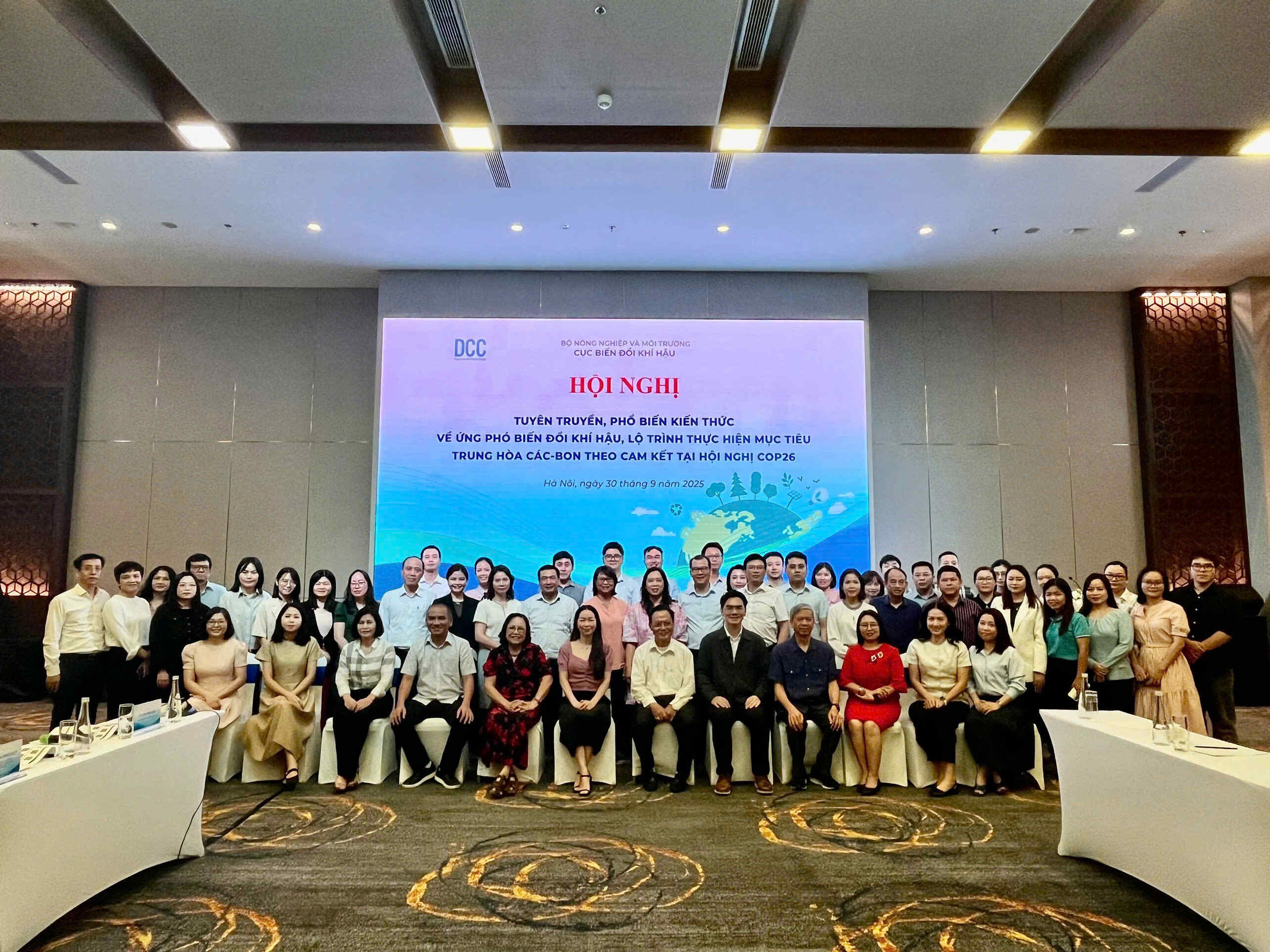When the Prime Minister of Vietnam declared at COP26 in 2021 that the country would aim for net-zero emissions by 2050, it was not only a pledge to the international community but also a commitment to its own people - an affirmation of responsibility to protect the environment, foster sustainable development, and safeguard the future of generations to come.
Since that historic moment, Vietnam has been steadily translating its global pledges into tangible action. Most recently, on September 30 in Hanoi, the Department of Climate Change under the Ministry of Natural Resources and Environment convened the Conference “Implementation of Vietnam’s Commitments at COP26.” The event was not merely a review of progress, but also a testament to strong political will, reaffirming the country’s determination to transform international commitments into practical outcomes.
Comprehensive commitments
According to Ms. Mai Kim Lien, Deputy Director General of the Department of Climate Change, the challenges posed by climate change to Vietnam are immense - ranging from coastal erosion, flooding, and drought to direct impacts on agriculture and the livelihoods of millions. This makes the translation of commitments into concrete action an urgent necessity.
 Ms. Mai Kim Lien, Deputy Director General of the Department of Climate Change, at the Conference.
Ms. Mai Kim Lien, Deputy Director General of the Department of Climate Change, at the Conference. At COP21, Vietnam joined other nations in adopting the Paris Agreement goal of limiting global temperature rise to no more than 1.5 degree C above pre-industrial levels. At COP26, Vietnam raised its ambition with the landmark pledge to achieve net-zero emissions by 2050 - a historic milestone underscoring its sense of responsibility and determination to stand with the world in confronting the climate crisis.
Beyond the net-zero target, Vietnam has also joined key international initiatives, including the Global Methane Pledge, the Glasgow Leaders’ Declaration on Forests and Land Use, and the Global Coal to Clean Power Transition Statement. These steps reflect Vietnam’s proactive role - not only as a responsible member of the international community but also as a country opening pathways to green finance, advanced technologies, and international cooperation projects. Such efforts provide crucial momentum to strengthen climate resilience while laying the foundations for a green and sustainable economy.
Coordinated implementation across all sectors
The Vietnamese Government acted swiftly after COP26. A series of strategic documents and policies were issued, notably the National Climate Change Strategy to 2050, the Implementation Plan for COP26 Outcomes, and new decrees on greenhouse gas reduction and carbon market development. These form a vital legal framework for ministries, sectors, and localities to craft and execute concrete action plans.
Dr. Luong Quang Huy, Head of the Greenhouse Gas Emission Management and Ozone Layer Protection Division at the Department of Climate Change, noted that since COP26, ministries and sectors have been developing emission reduction roadmaps aligned with the net-zero trajectory.
 Dr. Luong Quang Huy, Head of the Greenhouse Gas Emission Management and Ozone Layer Protection Division at the Department of Climate Change, presented at the Conference.
Dr. Luong Quang Huy, Head of the Greenhouse Gas Emission Management and Ozone Layer Protection Division at the Department of Climate Change, presented at the Conference. In the energy sector - at the heart of the transition, Vietnam has set forth Power Development Plan VIII, charting a course to gradually reduce coal dependence while scaling up renewable energy, including wind, solar, and biomass.
In agriculture, sustainable rice cultivation models such as the “One Must, Five Reductions” approach and alternate wetting and drying (AWD) irrigation are being expanded to curb methane emissions—a greenhouse gas dozens of times more potent than CO₂. The ongoing one-million-hectare project on high-quality, low-emission rice in the Mekong Delta exemplifies this green transformation in agriculture.
In forestry, Vietnam continues to enforce its ban on natural forest logging while expanding afforestation, natural forest regeneration, and sustainable forest management. The Payment for Forest Environmental Services (PFES) mechanism not only secures stable financial resources for forest protection but also improves local community livelihoods.
In waste management, the country is shifting from landfill reliance to advanced technologies such as waste-to-energy incineration, source separation, and recycling. Industry is also transitioning, with many enterprises adopting cleaner production, alternative raw materials, reduced clinker use in cement, and industrial greenhouse gas capture.
 The delegates attending the conference.
The delegates attending the conference. Business and community engagement
A defining feature of Vietnam’s net-zero journey is the growing participation of the private sector. Numerous domestic corporations are investing in rooftop solar, adopting circular economy practices, utilizing Renewable Energy Certificates (RECs), and building green supply chains. These steps not only reduce emissions but also strengthen competitiveness and expand access to international markets.
Equally important is the role of society at large. Grassroots movements—tree planting, recycling, energy saving, and sustainable consumption—are spreading nationwide. A green mindset is gradually becoming embedded in daily life, serving as a crucial pillar for ensuring that national policies are implemented effectively and sustainably.